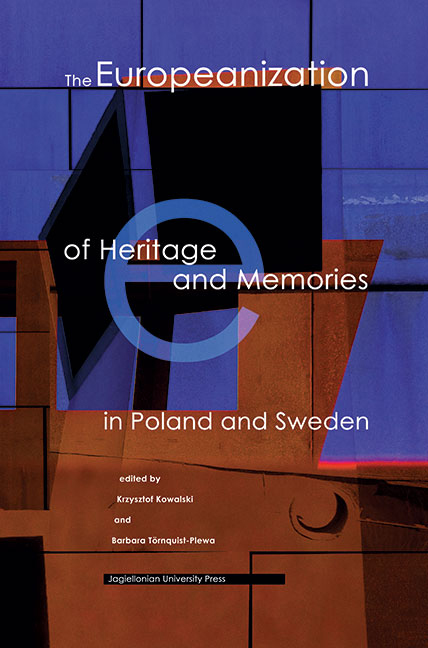Book contents
- Frontmatter
- Contents
- Acknowledgements
- Preface
- PART I European Heritage in the Making
- Heritage and Memory in a Changing Europe. Introductory Remarks
- Democratization as an Aspect of Heritage Europeanization. The Museum Triangle
- “A Dangerous Country.” The Council of Europe in Search of a Common Heritage
- Eurovikings. European Heritage Discourses and Transnational Practices in a Viking Site
- Euro-ethics. European Solidarity Centre in Gdańsk and the Narrative on the Polish Road to Freedom
- PART II Redefining the Dramatic Past
- Conclusion
- Notes on Contributors
Democratization as an Aspect of Heritage Europeanization. The Museum Triangle
from PART I - European Heritage in the Making
Published online by Cambridge University Press: 22 December 2017
- Frontmatter
- Contents
- Acknowledgements
- Preface
- PART I European Heritage in the Making
- Heritage and Memory in a Changing Europe. Introductory Remarks
- Democratization as an Aspect of Heritage Europeanization. The Museum Triangle
- “A Dangerous Country.” The Council of Europe in Search of a Common Heritage
- Eurovikings. European Heritage Discourses and Transnational Practices in a Viking Site
- Euro-ethics. European Solidarity Centre in Gdańsk and the Narrative on the Polish Road to Freedom
- PART II Redefining the Dramatic Past
- Conclusion
- Notes on Contributors
Summary
The goal of this chapter is to present heritage democratization as an important aspect of Europeanization processes. In the most general sense, the democratization of heritage is understood here primarily as providing wide access to symbolic resources related to the past, then also as empowering people to participate in the interpretation of those resources. Since heritage itself is defined for the needs of this text as a complex, discursive phenomenon the following analysis of heritage will refer mostly to communication practices. The main focus will be put on museums, as significant identity-forming institutions. First some dominant narrative strategies present in museums will be interpreted and then a typology of museums will be proposed in a triangle model which allows the positioning of these institutions according to the most important characteristics related to communication.
The past – distant, hybrid and complex – offers symbolic resources that are potentially valuable for collective identity formation. Stored and treasured in museums, it supports numerous identity oriented processes. In relation to the narratives of “then,” the legitimacies of “now” are established. Consequently, the control over the meaning making processes taking place in relation to the past remains one of the fundamental prerequisites of symbolic power. All these reasons can explain the importance of researching collective identity processes, such as Europeanization processes, with a focus on the domain of heritage: the dynamic discourse, where the past is constructed and transmitted.
Moreover, not only Europe as a whole, but also EU member states as well as regions, cities and other localities are in constant need for uses of the past with its potential for identity potential. In the construction of heritage this need is answered in various lieux de mémoire. What makes museums so significant in this respect is an the opportunity for personal encounters with heritage afforded by them there for visitors, and including visitors in the processes of heritage interpretation may result in creating shared symbolic communities, which in turn take part in shaping collective identities.
- Type
- Chapter
- Information
- Publisher: Jagiellonian University PressPrint publication year: 2016



